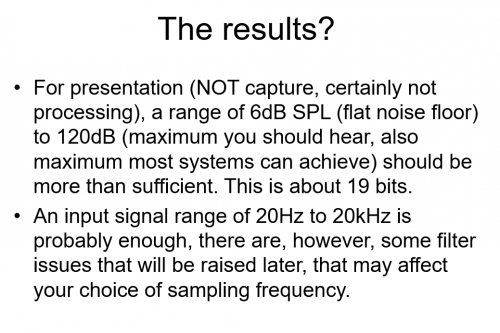OK, please manufacture your own. How long will it take you?
I did, years ago, numerous times and so can you. It should take you about 5 mins. Create a 1kHz sine wave at say -75dBFS in 24bit, create a TDPF dithered version in 16bit. Playback both files at a comfortable level (say with 60dB of gain) and it's trivial to hear the difference. Do you really not know how to do this?
And remember this, more and more we want to perform signal processing in our audio system. DSP and room correction is mandatory for proper sound reproduction in the room.
[1] As such, there is benefit in receiving music at > 16 bits even if our interest is limited to 16.
[2] You would be dithering the music twice if you perform the signal processing at higher bit depth (as you should).
[3] Bottom line is: the world is different now than it was when SACD/DVD-A were introduced.
1. How so?
2. Why would you need to dither twice?
3. How is it different?
[1] I like to get the original stereo master as created. ... Last thing I want is another uninformed "mastering engineer" playing signal processing god and deciding how to dumb down the music files for me.
[2] I can play the mastered format on my system thank you very much. Keep your hands away from my bits!
[3] Shaped? What percentage of your music has shaped dither? You don't know, right?
[4] It is just garbage proclamations that has no place in an informed discussion.
1. Make up your mind, do want the original stereo master or not? If you do, then that stereo master is created by a mastering engineer playing signal processing god. If you don't want a mastering engineer playing signal processing god then you can't have a stereo master because without a mastering engineer playing signal processing god, there is no master!
2. No you can't and even if you could, there is no way to get that mastering format to the consumer. There is no alternative to changing the bit depth!
3. Well, it's standard mastering procedure, so pretty much all of it. The exception would be with pieces where the dynamic range is so small that there's not a hope in hell of hearing the dither at any range of normal playback levels. With pieces where there might be a slight chance, classical music would often be a good example, then time is spent not just applying shaped dither but actually choosing an appropriately shape.
4. Again, make up your mind, which do you want? A discussion of purely published scientific papers/tests or an "informed discussion"? If it's the later then informed discussion surely must actually be "informed" (for example of the actual, real world practicalities of music performance, recording, mixing and mastering), otherwise you are likely to make "garbage proclamations" based on theory and/or outliers! Careful then with the insult of "garbage proclamations", those who live in glass houses ....
G





